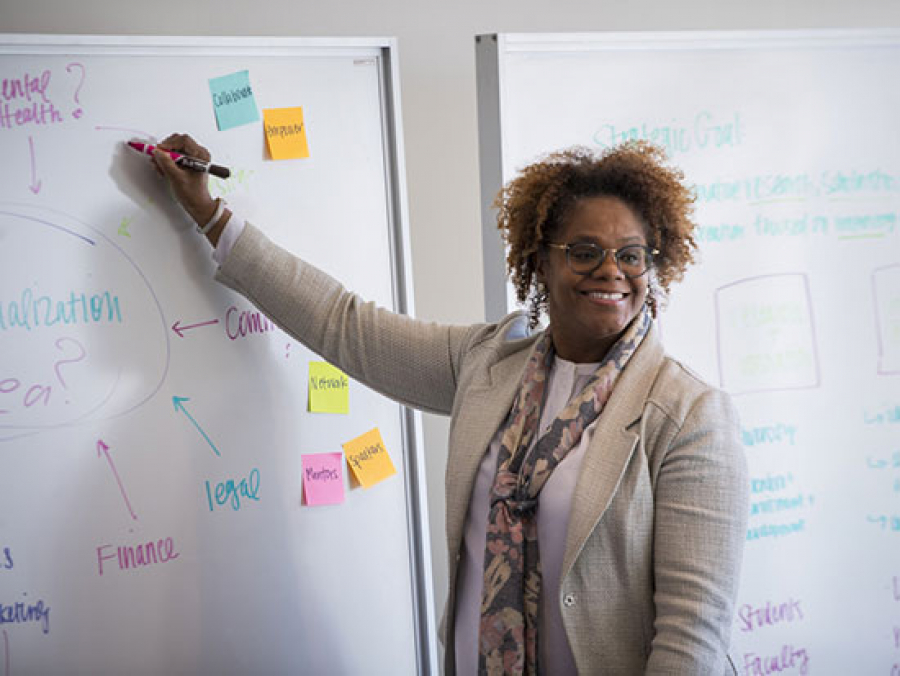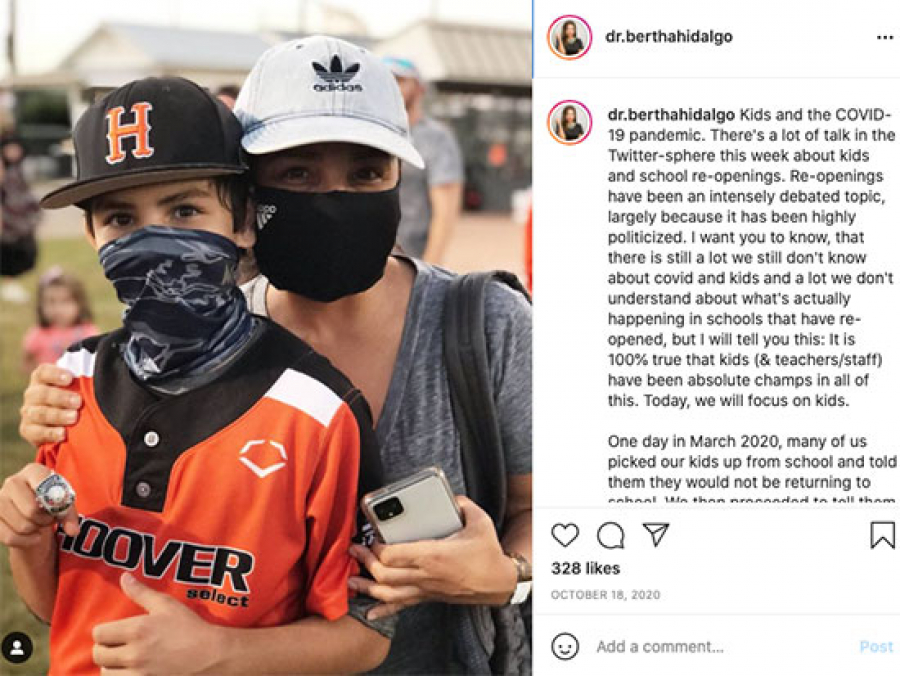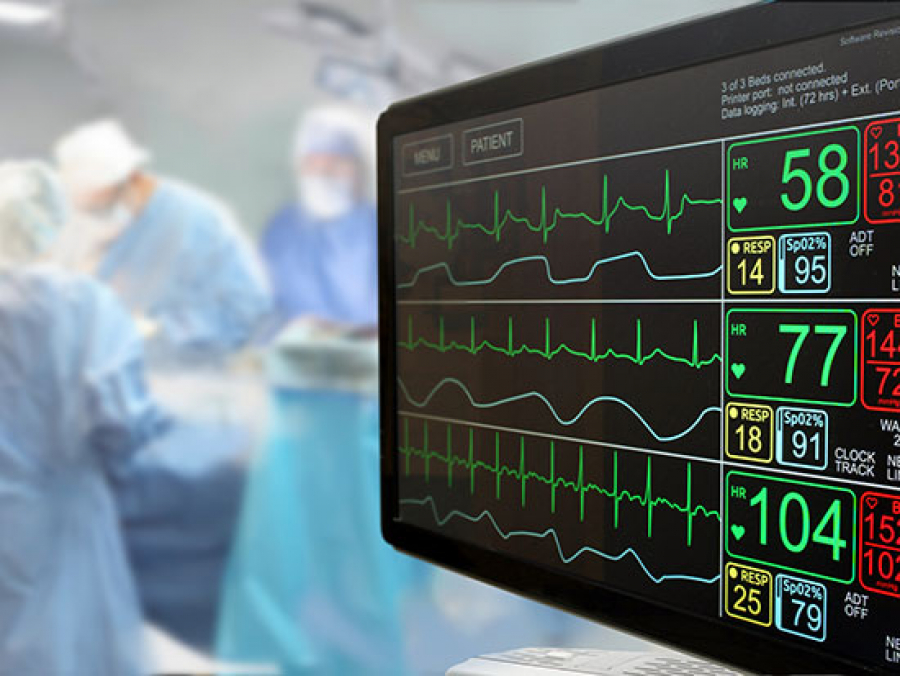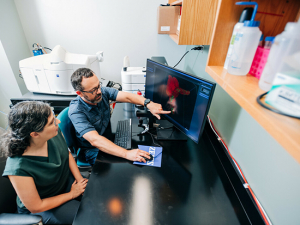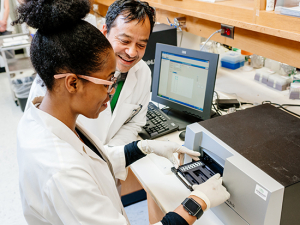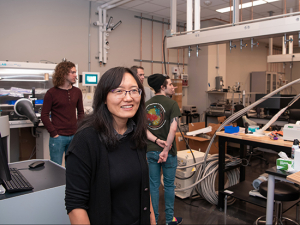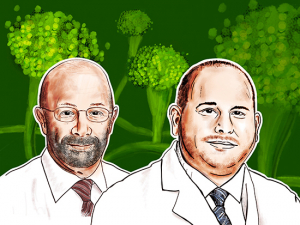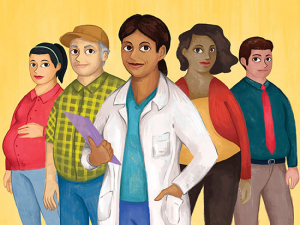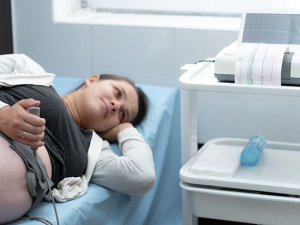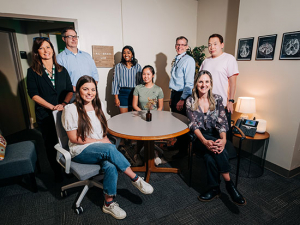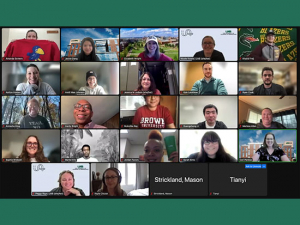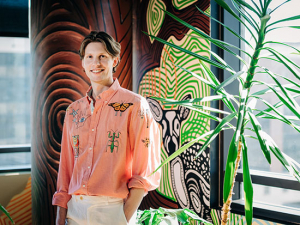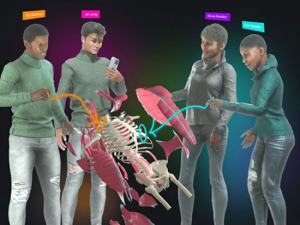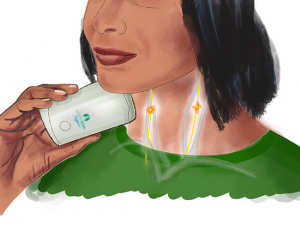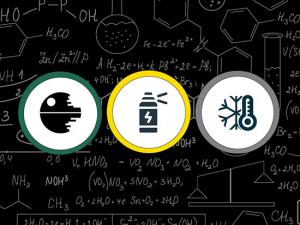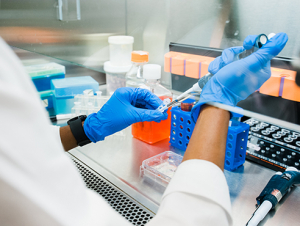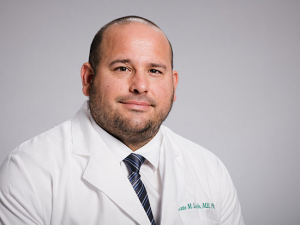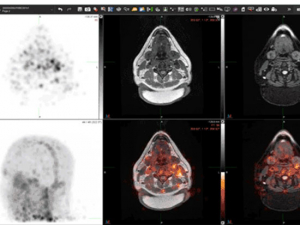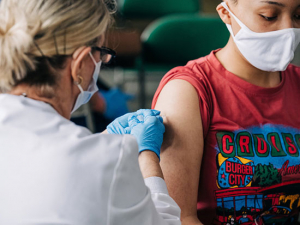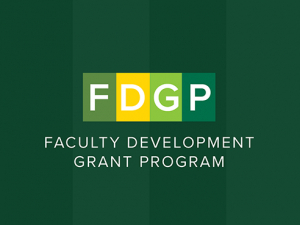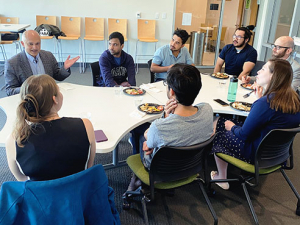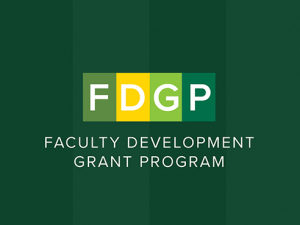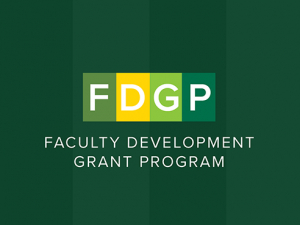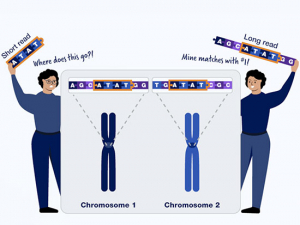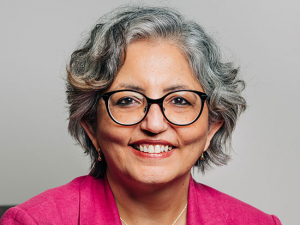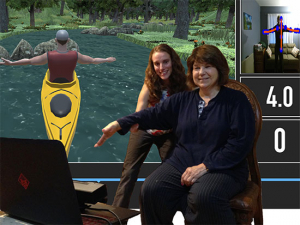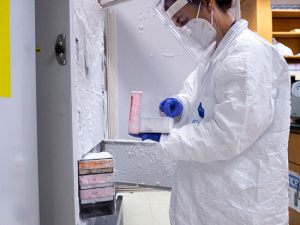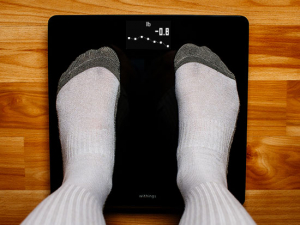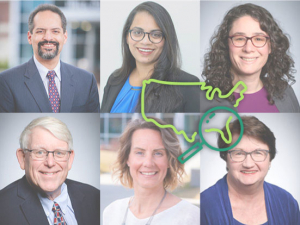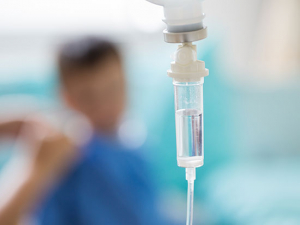-
Making sense of the data deluge with the UAB Biological Data Science core
U-BDS specializes in analyzing genomic and transcriptomic data, creating data pipelines, and keeping up with the latest methods and algorithms required for cutting-edge research.
posted 10 days ago 1083 viewsInternational recognition highlights the value of UAB’s cutting-edge Flow Cytometry and Single Cell CoreThe facility, one of 15 shared resource labs at UAB and among the busiest, is one of a handful of leading labs to be recognized by the International Society for Advancement of Cytometry, or ISAC.
posted 24 days ago 830 viewsMeet the leader of UAB’s Climate and Health InitiativeZhen Cong, Ph.D., professor in the Department of Environmental Health Sciences in the School of Public Health, shares her work on disaster preparedness of older adults and why she wants all Blazers to take part in the initiative’s work.posted a while back 868 viewsDoes your body really fight against weight loss? This scientist explains why the research says no.Many people, including clinicians and researchers, think “the main reason people regain weight after weight loss is because the body fights back” in a phenomenon called metabolic adaptation, said UAB researcher Cátia Martins, Ph.D. Martins, a leading scientist studying metabolic adaptation, explains what she has found and her plans for a groundbreaking clinical trial.posted a while back 2925 viewsThis neuroscientist is starting seizures in order to stop themRachel June Smith, Ph.D., a key recruit in UAB’s Neuroengineering and Brain-Computer Interface Initiative, can predict the frequency of stimulation that will push a brain into the chaos of a seizure — potentially saving patients with intractable seizures time, frustration and money.posted a while back 1998 viewsHow the HSF’s General Endowment Fund awards help UAB compete on a national stageOver its 28 years, this signature program has awarded grants totaling almost $60 million. Meet recipients and see how the HSF-GEF grants make UAB “a place where, if you have a good idea, you can find the support to make it a reality.”posted a while back 2578 viewsLargest whole-genome sequencing study in Kawasaki disease could point to precision treatmentResearch by UAB genetic epidemiologist Sadeep Shrestha, Ph.D., sheds light on a mysterious condition that is now the leading cause of acquired heart disease among children in the United States.posted a while back 2486 views4 cutting-edge machines powering UAB discoveriesWith research awards breaking all-time records, we toured labs where high-tech tools are driving science forward.posted a while back 3278 viewsMeet the UAB doctors protecting Alabama from killer fungiAlabama is a hotbed for fungal diseases — which is why experts in treating and tracking problematic fungi gravitate to UAB. This is great news for Alabamians as killer fungi become a worldwide threat.
posted a while back 6526 viewsFive lessons from the first five years of the All of Us Research ProgramHow the ambitious NIH initiative is turning precision medicine dreams into reality for hundreds of thousands of Americans left behind by previous studies — and where it is going next.posted a while back 4729 viewsFatal crashes rose in Alabama over past 3 years, new UAB study findsDespite fewer drivers on Alabama roadways and a decline in injuries per accident, fatal crashes rose over the three years from 2020 through 2022, according to a new analysis by UAB researchers published in the journal Accident Analysis and Prevention.posted a while back 2722 viewsAmid global ChatGPT obsession, UAB conference examines AI’s role in advancing health care and researchExperts at ATTIS 2023 shared reports from the front lines, including how they are using ChatGPT in their labs, the need for regulation and why this is a “tremendous time” for health care.posted a while back 3556 viewsA neonatologist chooses to become a machine-learning expert to improve patient outcomesWith data from 25,000 deliveries at UAB, Vivek Shukla, M.D., aims to predict which fetal heart rates are cause for concern. He is also earning a Ph.D. in engineering to bridge the gap between clinicians and data scientists.posted a while back 3288 views“Dr. Impossible” aims to bring brain tech to the peopleTake a trip into the Alabama BRAIN Lab in UAB’s Spain Rehabilitation Center, where a team led by neuroengineer Jamie Tyler, Ph.D., is working with patient groups to test promising neuromodulation treatments for chronic pain, insomnia and more.posted a while back 7452 viewsCollat Professional Ed partners with researchers on leadership and professional development academyThe goal is to offer career development opportunities for all members of the NSF-funded IISAGE grant, led by Associate Professor Nicole Riddle, Ph.D., in the Department of Biology.
posted a while back 2322 viewsWhy do super-agers skew female? These researchers are drilling into the hottest hypotheses.In a search that encompasses geckos, bats, sex-switching fish and more, the NSF-funded IISAGE team is seeking data to explain lopsided lifespans. A key question: How much wiggle room is there in aging?posted a while back 4407 viewsThis med student is on a mission to make tattoo inks safeA chemical mystery drew Matthew Kiszla into tattoo research: Why are red inks most likely to cause rashes and other reactions? Now he is working to analyze commercial inks and looking for collaborators both scientific and artistic.
posted a while back 11698 viewsInnovation Institute hosts country’s first metahealth symposium, Feb. 28The event will explore a future of health care that “is going to be anchored in the metaverse” and be the first such symposium to be held both live and in the metaverse itself, according to Rubin Pillay, M.D., Ph.D., executive director of the Marnix E. Heersink Institute for Biomedical Innovation.posted a while back 3355 viewsFour high-tech health devices being tested at UAB nowTake a look at new technologies being studied at UAB for treatment of depression, sleep apnea, traumatic brain injury and tic disorders.
posted a while back 5018 views3 UAB chemists break down their formulas for fighting cancerNew treatments emerging from the labs in the Department of Chemistry rely on split-second timing, tiny cargo bubbles and supercomputer-powered predictions.posted a while back 4658 viewsWhat you need to know about the new NIH data management and sharing policyBeginning Jan. 25, 2023, the National Institutes of Health will implement a new data management and sharing policy, which will increase the rigor, reproducibility and transparency of research and create open access to data.
posted a while back 4039 viewsMajor NIAID grant brings cutting-edge equipment to UAB for research on COVID and moreUAB scientists will have a new arsenal of state-of-the-art, high-end technology for their investigations in infectious diseases and pandemic preparedness through a $4.3 million scientific equipment grant from the National Institute of Allergy and Infectious Diseases.
posted a while back 3253 viewsResearchers hack adaptive cruise control, then show how to make it saferDriver assistance tech that comes standard on new vehicles can be tricked into causing accidents — but there is a way to alert humans in time. A UAB grad student and his mentor will share their findings this month at a global conference.
posted a while back 6553 viewsFirst-of-its-kind scan tracks immune invaders to explore puzzling brain diseasesPatients with multiple sclerosis, fibromyalgia and chronic fatigue syndrome will soon be able to enroll in the clinical trial of a PET agent that can capture evidence of brain infiltration by white blood cells and could eventually guide treatment.posted a while back 5203 viewsSalt boosts blood pressure for some people. UAB study asks: Who?By alternating high-salt and low-salt diets, a new clinical trial aims to find out how common salt sensitivity of blood pressure is in the general population. The researchers are also exploring whether the immune system plays a role.posted a while back 11775 viewsStudy: Expert-led discussions change student perceptions of COVID vaccinesAfter undergraduates in introductory biology courses talked with an epidemiologist and a physician specializing in infectious diseases, 60% who initially said they would not get vaccinated had changed their minds.posted a while back 4781 viewsMore faculty share the stories behind their development grantsPlant-based diets, biased language in the courts and the trouble with night lights: Recipients of 2022 Faculty Development Grant Program awards explain how they will use their funds.posted a while back 4392 viewsApply for fellowship to explore careers in technology transfer, commercializationGraduate students and postdoctoral fellows in the Innovate Fellows program are trained and compensated to evaluate new inventions on campus through market, prior art and patent analyses to assess commercial merit.
posted a while back 4724 viewsFour faculty share the stories behind their development grantsA civil rights field experience, safer MRI scans, investigating college stress and implementing a massive genetic test for cancer: Recipients of 2022 Faculty Development Grant Program awards explain how they will use their funds.
posted a while back 5366 views22 faculty receive grants to fund developmental projectsThe UAB Faculty Development Grant Program supports junior faculty with funding to pursue research, creative works and scholarly activity.
posted a while back 7516 viewsResearchers pioneering long-read sequencing studies explain why long reads matterNew technologies are filling in gaps in the human genome and opening major areas for discovery. Zechen Chong, Ph.D., and Robert Kimberly, M.D., explain the pros and cons and how they are using long reads at UAB.posted a while back 7525 viewsDespite gains in bone marrow transplant survival, late mortality still a concern, study findsResearch led by UAB’s Institute for Cancer Outcomes and Survivorship finds that patients who received BMT using their own cells over the past three decades lived on average seven years fewer than peers, but newer strategies have narrowed the mortality gap.posted a while back 31546 views‘Motor-gaming’ stroke tele-therapy matches in-person results at much lower cost, study findsA “flipped” approach to therapy using video games and short, motivational telehealth visits could spread the benefits of stroke rehabilitation far more widely.posted a while back 5497 viewsWhy do students choose immunology? New study answers questions on a crucial pipelineResearchers explore how to help budding scientists fall in love with a field that is incredibly important but can be “very overwhelming” to start.posted a while back 8255 viewsUAB study: Could this five-second obesity management strategy keep the pounds off?American adults tend to gain a pound or two per year. Researchers are testing a new approach to halt this creeping weight gain. They give participants a digital scale that graphs their weight over time and one job: step on it daily.posted a while back 12834 viewsThis long-running study proves that nice people finish firstMore than 100 different UAB researchers have been first authors on papers based on the REGARDS study thanks to its innovative design — and a uniquely “friendly and welcoming team.”posted a while back 7970 viewsUsing AI to translate old code and fix aging computer systemsUAB computer scientists are contributing to a DARPA-funded initiative with artificial intelligence-based programming languages that allow humans to understand the “safety and correctness of code in the wild.”posted a while back 6451 viewsStudy provides ‘critical information’ for treating childhood cancer patients with COVIDThe largest registry of U.S. children with cancer who were diagnosed with COVID-19 found an increased risk of having severe infection and having their cancer therapy modified because of COVID, underscoring the urgency of vaccinations for these children, the authors say.
posted a while back 4547 viewsExploring simulations, a philosopher finds clues to overcoming “failure of imagination”Lindsay Brainard, Ph.D., assistant professor in the Department of Philosophy, delves into the tools modern scientists use to generate new hypotheses in biology, medicine, astronomy — and philosophy.posted a while back 5297 viewsFeeling proud: UAB researcher’s work on touch cited in 2021 Medicine Nobel PrizeProfessor Jianguo Gu, Ph.D., was the first to publish direct evidence that the Piezo2 channel is the sensor for light touch in 2014. His lab continues to pioneer research that could ease the burden of chemotherapy, excruciating facial pain and other conditions.posted a while back 8144 views
